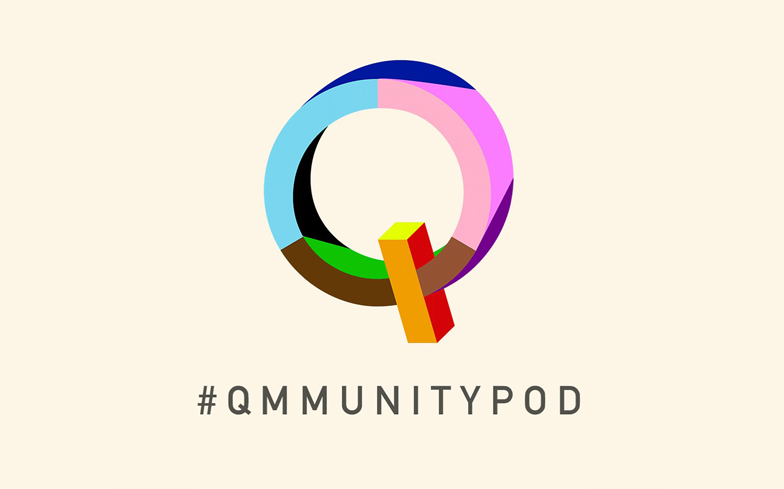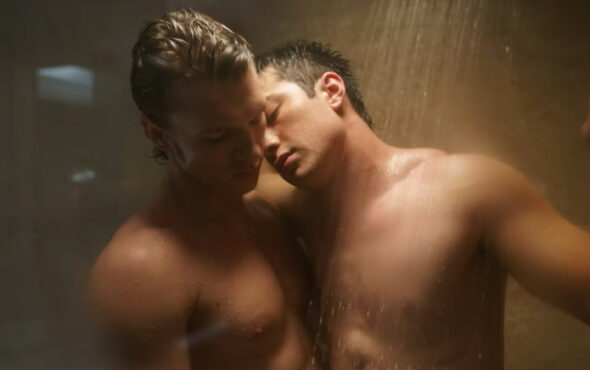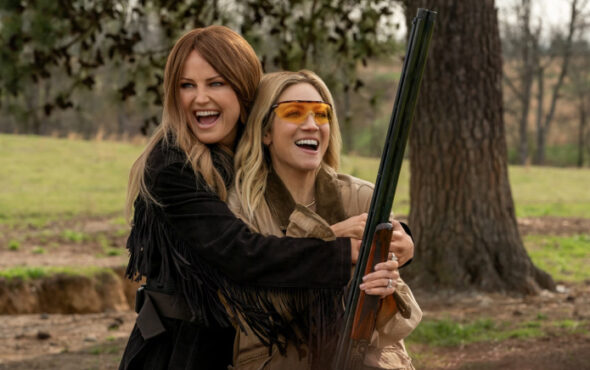
Next month will see the online launch of a brand new podcast that will explore what it means to be LGBTQ in 2018 for through a series of discussions.
Co-hosted by Alexis Caught and Christania, Qmmunity will explore conversations that need to be brought to the forefront of our community, bringing together people from across the spectrum of the LGBTQ initialism that may not usually come in contact with each other on a daily basis.
The hope is to dissect the current state of the LGBTQ community, from our successes and where we are going, to the challenges we still face, and the discrimination that exists from within the community itself.
The podcasts are currently being recorded throughout September in front of a live audience at the Ace Hotel in London, with new panellists each week giving their unique perspective on topics such as ‘What does it mean to be LGBTQ?’, ‘Threats to the community’, and ‘The intersectionality of sexuality’.
Gay Times caught up with Lex and Christania to find out more about Qmmunity, what makes it different from other podcasts out there, their hopes for the series, and how they ensured a diverse range of voices be featured throughout the panel discussions.
What inspired you to create Qmmunity?
Lex: The big thought behind it was, genuinely, a pre-thirties identity crisis of coming out of the gayteens – also known as straight people twenties – and kind of going, ‘Well, what kind of grown up do I want to be? And where do I fit with my identity within the LGBTQ community?’ I also saw a lot of friends who felt a similar way. They were at a bit of a loss. We’ve had a lot of changes in the way people identify, the way our gender and sexuality is perceived and talked about, and now we’ve got to – to use air quotes – legal equality, everyone’s a bit like, ‘Now what?’ Obviously not all, but some gay men are falling away into the chemsex scene, others are getting married and having children, other people are rallying against being labelled queer. But it’s also noticing that we were getting evermore segregated on social media with these algorithms that make it so you only ever see people who are exactly like you, and so we were losing some of the richness of it. So when I wanted to start Qmmunity it was an exploration of where have we come from and where are we going, because a lot people felt lost.
Christania: This is Lex’s baby, but I was brought on board as his co-host. I came on board because it’s a great idea and like he said, if you only talk to certain types of people, you are missing out on the conversations that are happening outside of your friendship group. So we’ve made sure the podcast is balanced with different types of people, with even me being the complete opposite of Lex as a black lesbian. I’m part of a community that doesn’t really interact with white gay men. I don’t really interact with anyone who isn’t POC and queer normally, and I’ve always been like that since I was 18. That is just by accident, so it’s good to talk about these things and come together as a community. Obviously it’s going to be harder for some people – and some don’t want to be involved for various different reasons – but I think this is going to be amazing.
Lex: It’s trying to find that middle ground. We’re told that we are all part of the same community, but actually we’ve ended up segregating ourselves within the community into people who are just like you. I get it, because you make friends with people you are similar with. You can’t be like, ‘Well I have to treat my friend like a tick box exercise where every single different type of person is represented.’ Christania and I wouldn’t have naturally crossed paths if it wasn’t for this podcast. We’ve been having the best time and we’ve discovered that there’s so much overlapping commonality between us. Everyone seems to be a lot more polarised these days with the way Twitter is very argumentative, so we thought that if you find a middle ground and bond over shared experiences and shared understanding – no-one’s point of view was ever changed by being shouted at – you build empathy with people and that’s how you bring them together.

What experience do you each bring to Qmmunity?
Christania: I’m bringing my fabulous self because I am amazing! No, not really. I think doing AZ Mag, which is an online publication we started in 2015 for queer, trans and intersex people of colour in the UK. So doing that over the last three years, I’ve learnt a lot about the community. I’ve learnt new terms, I’ve interacted with more people that I wouldn’t have done 10 years ago when I was in Heaven just drinking and dancing. So I’ve come on a long journey of self discovery and learning about other people. This for me is the next step. It’s a step for integrating different people from within our community’s sub-sections, and just having conversations that we’re not having out loud.
Lex: For me, it’s finally having matured to someone who’s a bit more self-reflective. When I was younger, I was very much ignoring the difficulty of gayteens by going, ‘Everything is fine now because I’ve left school.’ Which, when you put a plaster on things, they come out in different ways and they can explode in being unhappy or angry. So gaining that maturity, I realised that I do not have it all figured out as much as I thought I did. So what I bring to this is someone who is quite honest and will be like, I don’t know the answer. I know that I’m supposed to know this, but if I don’t ask these question I’m never going to learn. I want to, for a better phrase, have a safe space where everyone can learn.
Why have you decided to shake up the podcast format and record it in front of a live audience?
Christania: I think it will be interesting. I listen to a lot of podcasts – like, too many – and they always have live shows at the end of the season. It’s nice to hear other people reacting and laughing. So we’re doing it the other way around. We’re doing the live shows before we’ve even promoted the episodes. It’s just good to be innovative. It’s a good way of promoting the podcast before it has been released.
https://www.instagram.com/p/BnmSpXalDsu/?taken-by=qmmunitypod
Lex: When we came up with the idea for the show, we really wanted to have a live audience because the show is not about us. We’re not one of those podcasts where we’re front and centre. It’s genuinely about all of us. If it was just the two of us sat in my bedroom with a microphone, that’s not representative of anybody but us. So by inviting other people into that conversation, let’s ask people who might have the answers. We won’t even have all the questions, so let’s fill the room with people who will have them. Also, if we’re called Qmmunity and it’s about the community, well let’s do our bit to help start building a community. Just by looking at ticket sales, it’s people from all over different communities who are going to be in a room together asking interesting questions and hopefully learning and expanding the conversation.
As you’ve mentioned, you’ve ensured there’s diversity across all of the panels, so how did you decide on the people to ask be involved?
Christania: I literally had a spreadsheet and was like, ‘I like this person and this person.’ It was people I had worked with before. Part of the problem is, a lot of the people who have interesting things to say don’t have a large social media following. If we’re honest, in this time now, 40,000 followers for instance will help. Lex could be chatting shit basically on his platform, but people will listen because he has an audience. He has 40,000 people who follow him and are interested in what he has to say. That’s great, but there are other people who have 400 followers who are saying things that are better than what Lex is saying, or have a different point of view. It’s important to elevate those people.
Lex: It’s been a big thing of trying to find the interesting people who have stories to tell, and not just the same people that you always hear from, giving the same story. If we’re perfectly honest, I’m going to criticise it because I am it, but what we see a lot of in gay media is white middle class gay men. Even sometimes when I hear those, I can’t relate to it because it’s so privileged. It’s also not expanding my understanding anymore.
Christania: That’s the thing, if you’re only interacting with people who are like yourself, then you’re not going to learn anything. Those men have more privilege than you do or more experience, but you’re still not learning anything from them.

What makes Qmmunity different from other LGBTQ podcasts?
Christania: I don’t know that many LGBTQ podcasts that are made in the UK. I know two, and I learnt about them through Lex. I didn’t know about them before. So that’s the first thing. I think the topics that we’re going to discuss are going to be interesting. They’re going to make people feel uncomfortable and that’s good, because if you feel uncomfortable then that means you need to do some internal thought. You need to go back and think, ‘Why did that make me feel uncomfortable?’ Just use your brain a bit more and expand your mind. It’s sets us apart quite a lot I think.
Lex: What we have in common with some of the other podcasts is that actually what we want the sound to be is two friends having chats with interesting people. But where we are different is that those conversations that we are having will actually expand our understanding. I thought I was quite good with LGBTQ politics and history, but I’m already learning new things. We’re interviewing eyewitness people to preserve moments of our history. So, what was it like when you stormed the BBC? How did you set up this foundation? Why did you do that? It’s not about us, it’s about the community. Hopefully other people will learn and have fun and understand a bit more about where they’ve come from.
Is there a particular discussion you’re excited for?
Christania: I’m looking forward to all of them obviously! But I’m looking forward to the one about the future of the LGBTQ community, and the one about intersectionality. With the future one, I’m nearly 30 so I don’t think I’m the future anymore. It’s such a funny age because I’m not old, but I’m not 21. For someone like me who’s 10 years younger, I’m more concerned with what she’s going to be doing, and I want to help nurture younger people coming up. The internet makes it easier to do that. When I was 18 I was on MySpace, but I was still struggling. The kids now have more choice and more opportunity and it’s exciting. With the word ‘queer’, when I was going to Heaven, Sugar Rush, all these places, I wasn’t queer. We didn’t use that word. I’m not queer now, but I didn’t hear other women using that term. Things are changing and we need to move with the times. You have to look back to figure out where you’re going, but it’s exciting to see where we’re headed. In terms of intersectionality, because of the work I do with AZ Mag it’s important to me. It’s having the AZ Mag conversation in real life with new people. Like, there are black trans women being killed at an alarming rate, and these the kind of conversations we want to bring to the forefront.
Lex: As an audience member I’m most excited for the panel on intersectionality. Christania is hosting that one, and I think I’m going to learn so much from that.
https://www.instagram.com/p/BnCRRKUl-O6/?taken-by=qmmunitypod
Debate can sometimes get toxic on social media – how do you each deal with opinions that are radically different from yours, and how would you handle that if it happened during a panel discussion?
Lex: I can remember when I first used Twitter it was all fun and frivolity and people just making silly jokes. Then people started to become more politically conscious and aware that Twitter could be a tool for social change and activism. But at the same time, people also started to become aware that you could make a name for yourself on the platform. People were getting writing gigs or presenting jobs and actually making real money off the back of making a platform. However, that also led to a lot of people on Twitter – myself included – rather than thinking issues through from a nuanced perspective, jumping to be who can be the most outraged in 140 characters so they get the first load of retweets. I left it because I just saw it making everybody angry and no-one ever putting down their pitchforks.
Christania: I don’t engage with people on Twitter. I use it to retweet AZ Mag stuff, community stuff, and retweet memes and that’s it! I use Instagram to upload pictures of myself and that’s it. I don’t engage. You’ll get blocked. Because people are more politically aware now, and there are things that I’ve learned from there that I didn’t know five years ago and that’s great. Off the back off Twitter I bought books about blackness mainly, just to learn new things. So there is that. In terms of the panels, I think I’ll just be lukewarm. Not try to talk over people during the conversation, because the whole point is to moderate it and make sure no-one feels uncomfortable. I’m not where Lex is yet on his journey. I’m angry because the world is unfair. I’m not angry all the time, but I just don’t like injustice and seeing people being shit. Everyone is out for themselves and I understand that, but some people are lower on the food chain than others. But yeah, I just wouldn’t engage with a racist. I just wouldn’t. This person doesn’t see me as a human being, so there’s no point me being loud and trying shout over them. It’s not that I don’t want to change their view, it’s just not my battle.
To see the full list of Qmmunity live recordings and book tickets, you can visit their official website here.
What’s more, at each live show Qmmunity will be running a ticket giveaway to some of London’s biggest shows, including Strictly Ballroom, Kinky Boots, and Dreamgirls.



